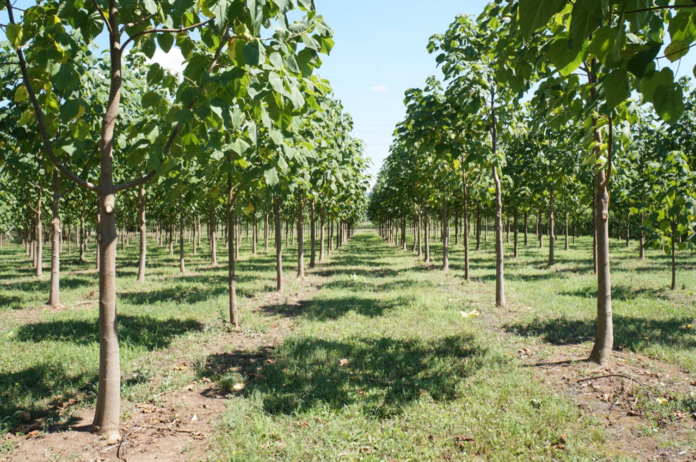Carbon Plantations Ltd, a new business backed by Aether Energy Ltd, has received regulatory approval from the Forestry Commission for what is described as the UK’s first ever plantations of a new hybrid species of Paulownia in Norfolk and Suffolk.
While Paulownia trees are widespread in Asia, this new Paulownia variety is an infertile hybrid which has been bred to grow in the Northern European climate and can tolerate temperatures as low as -22C.
It has already been grown successfully in plantations in Germany, Italy and Spain, as well as other continents.
According to Carbon Plantations, the new hybrid Paulownia trees can absorb up to 10 times as much CO2 during 80-year lifetime as new mixed native woodland.
Nigel Couch, Chairman of Carbon Plantations, commented: “We all know the urgency of taking action to tackle the climate and ecological crises, and increasing tree planting is a key part of the government’s Net Zero strategy.
“Farmers planting trees on their land is as old as the hills, but new varieties can also offer exciting and progressive solutions.
“No other tree can sequester as much CO2 as quickly as the Paulownia, and its wood is known as the aluminium of the timber industry.
“This new hybrid variety offers huge potential benefits for biodiversity, carbon capture and UK hardwood supply. These first four plantations alone are expected to sequester over 1.5 million tonnes of CO2 in their lifetime – it’s a win-win for the climate and for farmers.”
The four pioneer projects granted approval are on the Euston Estate in Suffolk and South Pickenham, Westacre and Rutterfords Estates in Norfolk.
According to Carbon Plantations, each has been through a rigorous regulatory process and a full Environmental Impact Assessment.
The statutory process was managed by Brown & Co with the Forestry Commission having the final say. The Commission has imposed strict conditions related to site monitoring, taking the lead from Forest Research.
The Paulownia tree is thought to be one of the fastest growing trees in the world, reaching up to 8m in five years, with an equally efficient rate of CO2 absorption.
When grown in a properly managed plantation, Carbon Plantations predicts that it will capture over 60 tonnes of CO2 per hectare per year over its average 80-year lifecycle.
According to the company, the infertile trees are grown from cuttings, so there is minimal risk of invasiveness. They are deciduous and will be planted alongside additional mixed native woodland species, designed to UKFS (UK Forestry Standards).
The understory will be sown with a native grass seed mix enhanced with wildflowers and legumes to further boost biodiversity and attract pollinators, other insects and birds.
According to Carbon Plantations, the land used for the plantations is mainly agricultural land which has previously been intensively farmed, with high inputs of pesticides and fertilisers.
The soil, degraded over time, will benefit from regeneration and restructuring thanks to the deep roots of the Paulownia trees and the falling leaves which act as a mulch to enrich the understory.
Over time the land will soak up more water, reducing the risk of flooding, by naturally increasing its organic matter content.
As well as sequestering CO2, the Paulownia plantations will provide a locally grown source of hardwood timber displacing the need to import wood from abroad, including tropical hardwoods, and further reducing emissions from transport and logistics.
The timber is described as both lightweight and strong, more fire resistant than other species, and is stated not to warp easily. It is also reported to have good insulation properties, making it ideal for use in light construction, furniture making, industry, and other applications such as surf boards.
Overall 468ha will be planted across the four estates. While the exact proportions vary slightly on each site, the planting mixture will be approximately 75% Paulownia hybrids, 15% native woodland and 10% grassland as approved by the Forestry Commission.
Collectively the four plantations are expected to sequester over 1.5 million tonnes of CO2 over their 35-year minimum lifecycle. Carbon Plantations has a target of planting another 600ha of Paulownia each year for the following two years.
The first timber harvests can take place after six to seven years, when the plantation is thinned, with a 10-year cycle typically following.
At the end of the plantation’s 35-year lease, it can either remain as permanent woodland or be returned to its previous agricultural use, in consultation with the landowner and the Forestry Commission, and subject to legislation at the time.
Planting is expected to start in May 2022. The trees will be supplied by WeGrow, who will also oversee the initial planting of the plantations supported by a local team of silviculturists and agronomists.
Tree cover in the UK is far lower than its closest neighbours – just 13% compared to the European average of 38%.
Through its England Trees Action Plan, the government recently set a target of trebling tree planting rates in England to 7,000ha per year by the end of Parliament, increasing to 30,000ha across the UK by 2025.
Some financial support for the projects comes from the Forestry Commission’s Woodland Carbon Guarantee scheme, which guarantees the floor price for the carbon credits generated by the growth of the trees.
Paulownia at scale is not currently eligible for capital planting grants from the Forestry Commission.
